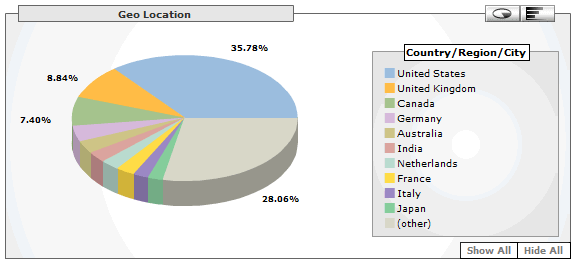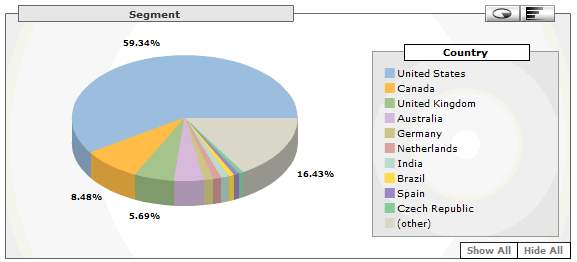Is Digg Too U.S.-centric?
That may seem like an extremely obvious statement to some but in taking a look at some numbers after an article got dugg, I was surprised by just how much.
First, lets take a look at the country breakdown of the visitors for this site:

As you can see, the US is a huge chunk of that and this is fairly average from month to month. Nothing too surprising, really. Four of the top five countries are primarily English-speaking countries.
But look what happens when we isolate traffic coming from Digg:

Suddenly, the US constitutes over 59% of all traffic. Canada also stays pretty strong, obviously showing a strong Digg following here, as well.
What does this mean?
As questions surround the future direction of Digg, the key question is whether there is a way that Digg can break out of its North American mold?
The two major directions they can take are:
- Offer localized content, and/or
- Offer multilingual content.
Localized Content
This is probably the easiest problem for them to solve. Digg would offer users the ability to tag content as relating to a particular country. Then, give users the ability to view only content from one or more regions.
If done right, like how the categories are currently set up, it has the potential to bring in more international readers, establishing microcommunities within specific niches, without feeling exclusionary.
Multilingual Content
Going multilingual is a much bigger target and certainly more difficult to pull off. At the very least, the articles themselves could be posted in whatever language and simply hope that people Digg those articles up, similar to Del.icio.us. The problem is, Digg'ing an article isn't as useful as a solitary task, it's the popularity of the masses that has given Digg it's popularity.
To create a multilingual interface, on the other hand, would allow Digg to build new communities simply based on the Digg concept and brand. This doesn't always work, though, as often times other countries already have similar services who've filled the void instead of waiting for a localized interface.
Room to Grow
Either way you look at it, Digg still has room to grow and 2007 will not be the year we see them crash and burn.
Conversation
Much of the web is US centric, including the ownership of it. It started in L.A. and Silicon Valley is also in California. I'd be curious to see what the distribution of Internet activity is world wide. My gut says the order would be just as your first stats say: US, UK, Canada, etc.
I can nothing but agree with Justin. Being a Dane, it can sometimes annoy me a slight bit of how US-centric most American personal websites are. It's a minor thing, but just the fact that Americans write where they're from as City, State, without ever mentioning that they're from the US, just gives you an idea of it.
Oh well, I'm not here to be a bitter jerk. Just wanted to point that out.
As of the future of Digg, and indeed any other website, i18n is the question. However, most of Digg's tech news apply pretty broad, so localized content generally would be of much use. But with Digg having expanded into other areas, localized and multilingual content is certainly a good idea, and something I don't doubt they're looking into.
~j
P.S.: About Justin's Internet activity thing, I do believe that some of the larger Asian nations should be on your list.
Speaking of Asia, I've read somewhere that the most popular blog in the world, in terms of visitors, is that of a Chinese actress. Yet, few people in the U.S./english-centric web have even heard of it.
It makes sense that language, more than geography, would be the limiting factor. And a large portion of the english web is U.S.-centric.
as you mentioned, digg needs to split their posts into countries or languages.
or digg needs more openminded useres. cause every time someone posts a really good link an the content of the link was in german everybody starts flaming.
i think that a lot of digg users don't understand that english isn't the onlny language on planet earth.
You seem to be drawing the conclusion that because most users arriving at snook.ca are American, that the readership of digg is mostly American?
To focus on the English-speaking stats for a minute though. The word 'digg' as a screwed up version of "Do you dig this?" feels like it's a bit of US slang or US culture, and isn't particularly appealing to the UK audience (IMO.)
I'd guess that the early-adopters of digg were very much US-centric, and that you're still seeing that skew today.
Would you expect your sites demographics to be the same as any/all linking sites? What are the demographics if you isolate incoming traffic from google, yahoo or live.com?
Ash, the only actual conclusion one can make from this is that the majority of Digg users who came to the site via that particular Digg were American and that this was a much greater percentage than from other sites. But it's likely indicative of Digg as a whole.
In comparison to other sites, Google was at 36%, Del.icio.us was at 35%, and even Stylegala was at 32% (obviously showing a slightly more international crowd). They're all within a couple percentage points of the site average though. Digg is the only referrer within my top 10 with such a dramatic demographic skew.
Europe was recently very active on the web 2.0 side. Behind UK, now France and Spain are running.
I was in Paris for Leweb 3 last month, things are growing fast, and news social aggregators will soon find their european way to european news. Wikio, as an example, is becoming more popular than Digg on local news search.
The web is actually US-centric, but if the so-called web 2.0 wants to go mainstream it have to consider this: that mainstream people outside the US are not US-centric.
So, now growing means localizing.
I'll accept the fact that Digg is U.S.-centric, but so what? Why is it necessary to change this?
I have stopped reading Digg and have switched fully over to Reddit for my reading pleasure. The usual Digg has gone downhill stuff applies.
A friend of mine posted about the American-ism of Digg a while ago, but in terms of the commenting on the various stories. Non-American views are quickly squashed.
Both my friend and I are Canadian :o)
Matt: nobody is saying it's necessary. However, there's an opportunity here for Digg to grow into other areas. Whether they choose to do that or whether the users will be accepting of that remains to be seen. The key thing I've pointed out here is the fact that yes, Digg is heavily American and that they have a couple directions in which they can go in to change that.
This is unrelated to your post, but I'd just like to say that I love your website/blog and its design. The ads are also implemented well. Great job.
Digg is very tech oriented. Netscape, I hear, is more neutral. And Tech subject is almost always global.
I similarly wish that Digg expand globally, but I don't think a lot of other countries know about Digg.
Nonetheless it does get interesting to see how a Western-centric site views topics about other countries. What I do at times (and this I post in my http://www.technopinoy.com blog) is to search Digg using my country (Philippines) as the search term. Interesting info does come out!
Let me see...
I'm in Poland and I can't watch BSG episodes on SciFi.com ...
My web page is first in polish google, when you ask about "Shadowrun", But I Can't find it in ask.com even, if I ask about "Shadowrun Polska"...
If you want to watch brainiac through skyOne.com , you can't if you're not in Ireland or UK...
Ok, but question was: Digg.co and rest of world.
Well.
Good thing:
- I can post :)
Bad thing
- No polish interface (and that CAN be done. Check http://google.pl )
Regional content would be an excellent idea. Google and the bbc use it and its pretty helpful.
It could even just work as an automatic 20% boost to the digg rating of articles from your chosen countries. That way REALLY popular stories from other regions would still make it into your view.
PS/ The MOST annoying thing is when you find an online shop, go through all the process of ordering (and probably signing up) only to find out they DON'T SHIP OUTSIDE THE USA. When the site itself makes no mention of being in the usa, it just assumes everyone will be from there.
That's correct - there is a lot of potential to Digg to be even more successful. I too would like to see more localized content.
IMO localized content misses the point of Digg... (Translation services would be awesome though!)
And I sympathize with the American ideology complaint... but my slant on it is that we need to prevail in the face of adversity!
Like a true demorcracy the masses fall victim to the propaganda of the powerful and the people need to call bullshit and speak up for what they believe... it's not enough to simply change the channel (or got to a different site instead in this case) people have to stay within the system and speak up and vote.
That's the point of Digg and I think one of its strenghts is that its a global (among english speaking anyway) thing...
/rant
Great story today on the homepage on the Danes windmill farms... and someone posted a link to a BBC snippet on a similar UK proposal... super intresting
Link to digg story
Anyways I hope you all stick with Digg... I am in Canada and know all about "too American" but overall I got to say Digg, thanks to many outsiders perhaps, keeps the site further away from Fox mentality than alot of other American sites / communities.
We should all keep up the good work!
/pep talk
Yes, there needs to be localized versions of Digg so we don't have be considered "International News" if we don't live in the US.
domtrc
PKjSE0 dkg93jfbkSdLk496c